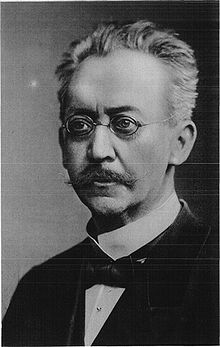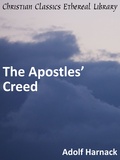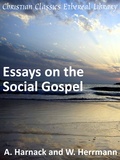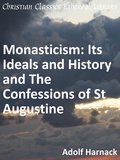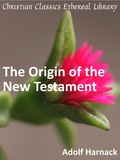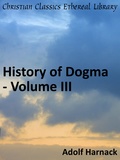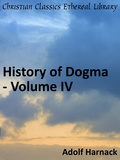Adolf Harnack
German historian and theologian
Biography
Harnack was born in 1851, in a Lutheran family, as the older of a set of twins. After his mother’s death in 1857, he became especially connected to his father, Theodosius Andreas Harnack, who was a teacher of homiletics and church history at the Lutheran University in Dorpat (a part of East Prussia; later, Russian province Livonia). Adolf’s father’s pious loyalty to Luther’s ideas, combined with the scholarly approach to the matters of religion, made a decisive impact on Adolf Harnack’s understanding of theology as vocation . When he was seventeen, Harnack wrote to his friend that he wanted to study theology not in order to be given the ready-made statements of faith, but in order to understand every statement of faith, and only then making them his own.
Harnack found support for his intellectual pursuits at the University of Darpat, where Lutheran orthodoxy was taught inseparably from the scholarly methods of historical investigation. The most important figure in his Darpat days was Professor Moritz von Engelhardt, his "magister, patronus and amicus". Professor Engelhardt’s insistence on the study of original sources and use of textual criticism was clearly reflected in Harnack’s university dissertation on Gnosticism. This work contained two elements that would mark Harnack’s scholarly work. The first element was the application of historical method in theological study, which prepared him for the acceptance of F. C. Baur’s (1792-1860) and Albrecht Ritschl’s (1822-1889) historical approach to theology. The second element was Harnack’s fascination with Marcion, which he would fully articulate only in 1920, with the work entitled Marcion, Gospel of the Alien God.
Harnack began his teaching career at the University of Leipzig in 1874, the same year he received his Ph.D. degree. In 1879, he transferred to the University of Giessen, where he completed the first volume of his History of Dogma. Although already known in theological circles as the editor of the Theologische Literaturzeitung and as an initiator of the series on the Church Fathers, it was with the publishing of the History of Dogma in 1885 that Harnack entered the epicenter of theological discussions.
These discussions reached the level of disputes with the second volume of the History of Dogma, when Harnack was criticized for using the New Testament and Christianity "as sources, rather than as norms, for the formation of personal faith". Fully affirming the principles of Ritschl’s historical criticism, Harnack here questioned the authorship of the gospel of John and baptism as being instituted by Jesus in the name of Triune God. This approach caused a break between Harnack and Lutheran confessionalism, received from his father and confirmed at Dorpat University. While Harnack believed that he could reconcile his new theological ideas with his theological background, his father saw their disagreement as not simply theological, but rather disagreement about fundamental Christian values. Harnack’s theological ideas, therefore, brought him fame but also introduced him into the world of controversies. One thing, however, was not disputable: his intellectual rigor and personal charisma were challenging for both his followers and his adversaries. Harnack was especially admired by his students. When in 1888, Harnack began to teach at the University of Berlin, his early morning lectures were visited by over four hundred students. In 1892, Harnack supported his students in the idea of the exclusion of the Apostle’s Creed from public worship. He argued this on the grounds of "personal credibility…over…mere credulity of worship", and affirmed the necessity of the individual study of the history of Christianity as a precondition for building up on the Christian faith. Harnack only once asserted that there was some higher good than the individual. In the time of World War I, he wrote that "one country’s life [is] something ideal [that comes in] place of the individual life[,] a great good [and] a high-spirited disposition…very closely akin to religion". Harnack historian and theologian was also a patriot who could assert that German greatness was founded on its defensive forces and its scholarship.
Harnack channeled his patriotism primarily in the wide range of administrative and cultural responsibilities; he was the editor of the Theologische Literaturzeitung for 29 years, the Rector of the University of Berlin, Director of the Royal Library, and the first president of the Kaiser-Wilhelm Foundation. For his work, he was awarded the hereditary title in 1914. At the same time, Harnack was a family man dedicated to his wife and four children. When he married Amaile Thiersch in 1879, he declared that "in [his] home there is to be no more working after 8 pm," so that he could give all his attention to his family.
Although deeply involved in the events of his time, Harnack never joined any political party. He twice refused the invitation to teach at Harvard; he rejected an ambassadorship to the United States. His task, Harnack was convinced, was to dedicate his energies to the development of "the freedom of thought, of pursuing truth on every path, the freedom from interference by those who have been given authority in human institutions". It was precisely Harnack’s insistence on the freedom of scholarship that marked him as one of the strongest advocates of liberal theology. Adolf von Harnack thought that the only way to nurture Christian faith was to remain in the condition of permanent uncertainty. No student of theology, he believed, should be spared a profound crisis; the worst condition is not when one has doubts about theology or authority, but when one is trapped in the sponginess of mind and indifference. Harnack died in Berlin, in 1930.
